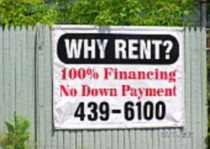Investment opportunity: Pima County’s delinquent property tax liens go up for sale
Inside Tucson Business February 08, 2008
It’s the stuff of which late-night TV infomercials are made: An investment opportunity where anyone can make money. Welcome to Pima County’s annual tax lien sale.
On Wednesday (Feb. 13), The Daily Territorial will publish Pima County’s annual listings of properties whose tax liens are up for sale.
There are a number of organizations happy to take your money to explain how the system works and how you can make money from it.
Then there’s this opinion from Pima County Treasurer Beth Ford: “Welcome to, in my humble opinion, the ultimate in buyer beware. On your own volition, you are about to do business with government and government has written every one of the rules by which we play this game. Caveat emptor! Let the buyer beware! Good luck and good bidding.”
For people who know and understand the rules, there is money that can be made. In fact, some of those online services say Arizona’s system of selling tax liens makes for one of the best investment opportunities of its kind in the nation.
Investors can earn up to 16 percent return for buying tax liens, though typically the most desirable properties wind up with interest rates far less than that. And that’s precisely what investors are bidding on in these auctions. Whoever bids the lowest interest rate wins.
And for that, the successful bidder gets a certificate from the county that says they hold the tax lien.
Then, there is the possibility the lien certificate holder could ultimately wind up as the owner of the property. But that takes some more work involving the courts.
Here are some FAQs to help explain Pima County’s delinquent tax lien sale:
Q1. What tax liens are sold?
A. When an owner fails to pay property taxes, a tax lien is placed on the property. After two years of not collecting taxes, the county puts liens up for sale in an effort to return the property to taxable status. The property liens going up for sale this year are on taxes that haven’t been paid since 2006.
Q2. What exactly do investors buy?
A. Not the property itself. It’s a tax lien certificate.
Q3. How do I find out which properties have liens up for sale?
A. The property liens will be published in The Daily Territorial on Wednesday (Feb. 13).
Q4. What information is published?
A. Each lien has a specific item number and then is described by its parcel number, name of property owner and property description as it appears on the County Assessor’s tax rolls. (There is no guarantee from the County Assessor that its information is correct.) The listing also contains the amount of the tax lien due, including interest and penalties as of the end of February.
Q5. How do you buy the tax lien certificates?
A. They are sold at auction. This year, Pima County’s auction starts at 8:30 a.m. Feb. 27 and will continue until all properties have gone through the auction, which will probably be Feb. 29.
Q6. How do I know when each parcel’s tax lien goes up for sale?
A. Parcels are auctioned in the order in which they appear in The Daily Territorial on Feb. 13.
Q7. How many people usually show up at the auction?
A. Typically about 200, though less than half usually bid.
Q8. Where is the auction?
A. In the Pima County Board of Supervisors hearing room in the County Administration Building, 130 W. Congress. St.
Q9. What do I do with the information that’s published in The Daily Territorial?
A. This is where the real work comes in. If you find a piece of property that interests you, investigate it thoroughly. Consider whether you believe the property will be worth owning if you need to initiate foreclosure. You should also thoroughly research the genealogy of the property. Was it subdivided from a larger parcel that might also have had liens on it that somebody else owns? Determine if there are any issues over the title, including environmental problems. That abandoned gas station on a busy corner may look like prime real estate but not if there’s an old gas leak that needs remediation.
Q10. Are there other warnings of pitfalls?
A. Some of the more common warnings include the possibility the Board of Supervisors could change the classification or value of the property to either adversely affect the amount of the tax or increase the amount of the tax lien that is owed (in which case the certificate holder would have to pay the additional amount). There is also the possibility that a property either has or will declare bankruptcy, which puts the matter in the court’s hands. There might also be special assessments that have been levied on the property that the county might not know about, such as a homeowner’s association fee.
Q11. Are there resources to help with the research?
A. The Pima County Treasurer’s Office has computer research tools and access to microfiche and microfilm data. Delinquent tax specialists are also available during normal county hours, 8 a.m. to 5 p.m. weekdays. The phone number is (520) 740-3785.
Q12. What do I bid?
A. Basically, you’re bidding on the interest you’re willing to accept on the delinquent tax that’s owed. By law it starts at 16 percent and goes down. The lowest interest rate wins. A desirable piece of property could have an interest rate of 5 percent or less.
Q13. Who do I pay and what?
A. You pay the Pima County Treasurer’s Office the tax lien, which includes interest, plus a $20 fee to process the transaction and be issued a certificate.
Q14. When do I pay that amount?
A. By the close of the following business day after you are declared the successful bidder of a tax lien.
Q15. Can I back out after the auction but before paying?
A. By law, the county can recover from you the amount of the lien if you don’t pay it on time.
Q16. Once I pay the delinquent taxes, what happens to the property?
A. It remains in the property owner’s name but with a lien on it from the holder of the certificate.
Q17. Who pays the future property taxes?
A. The property owner could pay current taxes but in lieu of that, you, as the lien certificate holder can. Whatever you pay is added to your initial investment and will continue to draw interest at the same rate as originally bid until the tax lien is redeemed or foreclosure.
Q18. Do I ever take deed of the property?
A. After holding a lien certificate for three years, you can initiate action in Superior Court to take the deed.
Q19. Is that what usually happens?
A. No. Usually liens are paid off within two years, though sometimes lien holders have to force the issue by initiating foreclosure proceedings.
Q20. Are all of the tax liens sold?
A. Far from it. Last year, for example, 10,467 parcels had liens put up for sale. Of those 2,143 liens – 20 percent – were sold at auction.
Q21. What do I have to do to be a bidder at the tax lien sale?
A. You must register. Official registration begins one hour prior to the auction but you can save time by pre-registering with the Pima County Treasurer’s Office, 115 N. Church Ave. You’ll have to supply them with your tax identification number and complete a W9 form.
*****************
Coach Mitch’s REFLECTIONS
Great article.
This is the entire article. I will give editorial comment in Part 2.
Did you know the answers to the questions?
There are some surprising ideas that I would add to some of the answers. Hint – I tend to look where others fear to tread.
That is why Coach Mitch’s “Ridiculously Simple System…” is so important.
The big profits are made when the conventional wisdom says “No” and you say “Maybe – let’s take a look.”
The big opportunities present themselves when you investigate what others are afraid to chance.
Luck is created because you see what others are afraid to look at.
Your future is made when you understand what others cannot fathom.
Coach Mitch’s system works. It is not hard – but it is not obvious. And that is good.
See Coach Mitch’s “Ridiculously Simple System…” ™ for details.
Blue skies,








Leave a Reply